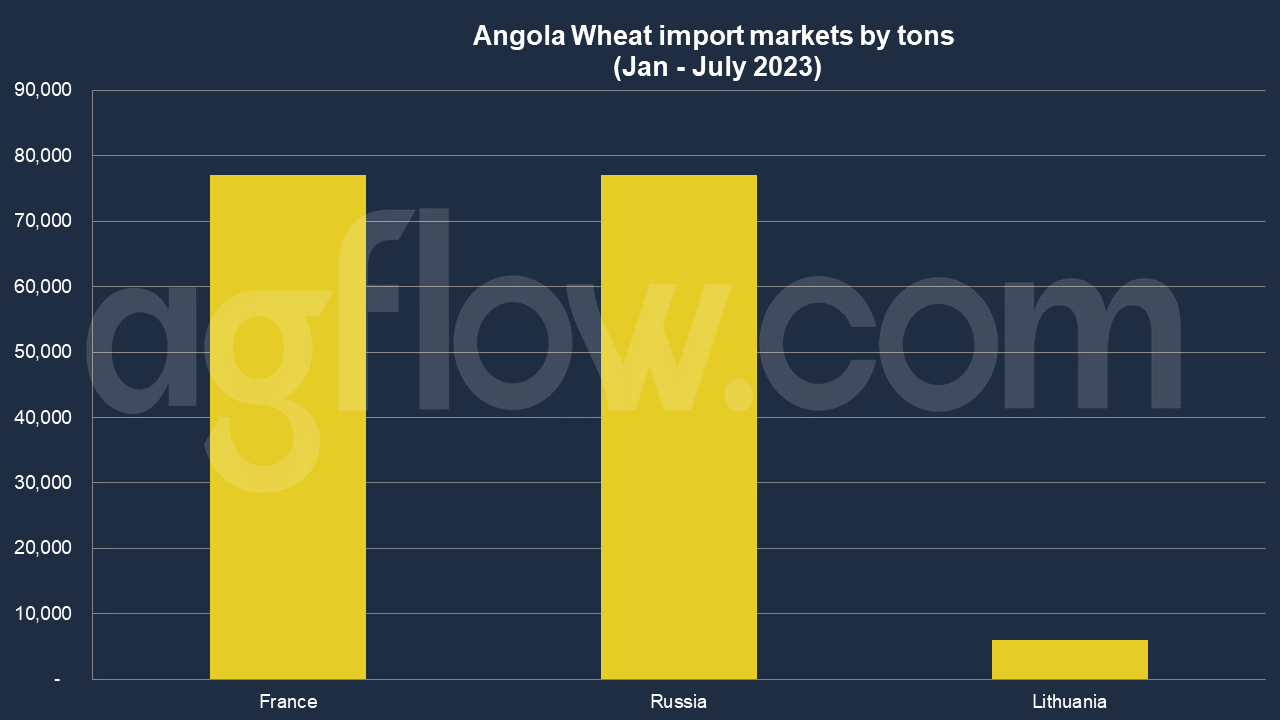Angola Wheat Trade: France vs Russia
Talk to our team about AgFlow's offering →
Reading time: 2 minutes
Angola, a country known for its rich natural resources, has been making strides in the global wheat trade. But what exactly is happening in the wheat market in Angola? How are the exports and imports shaping up, and what factors influence this trade? Let’s dive into an insightful analysis exploring Angola’s wheat trade dynamics from January to July 2023.
The Dynamics of Angola’s Wheat Trade
Angola’s wheat export market has seen a significant uptick in the first half of 2023. But why? Is it merely a stroke of luck, or is there a method to this madness?
The answer lies in a combination of factors. The government’s initiatives to boost agricultural production, favorable weather conditions, and strategic trade agreements have all played a part in this success story. But it’s not all sunshine and rainbows. The challenges of maintaining quality standards, transportation logistics, and fluctuating global prices are like the waves in the ocean, constantly threatening to overturn the ship.
Think of Angola’s wheat export market as a well-tuned orchestra. Each instrument (factor) must play in harmony to create a melodious tune (successful export). One wrong note and the entire performance could falter.
On the flip side, Angola’s wheat import scenario presents a different picture. According to AgFlow data, Angola imported 77,000 tons of Wheat from Russia in Jan – July 2023. France supplied the same amount of Wheat to Angola during the same period. Total imports hit 0.16 million tons in Jan-July 2023. Angola was purchasing large amounts of Wheat from Russia and France, such as 27,000 tons and 33,000 tons.

July shipments were the largest in Jan – July of 2023, with 60,000 tons. The following months were Feb (53,000 tons), June (25,000 tons), and May (22,000 tons). The country’s growing population and urbanization have led to an increased demand for wheat products. But is importing the only solution?
The answer is as complex as a spider’s web. While importing helps meet immediate demands, it also poses challenges such as dependency on foreign markets, currency fluctuations, and potential disruptions in supply chains. It’s like walking a tightrope; one misstep can lead to a fall.
The government’s efforts to balance between self-sufficiency and imports are akin to a chef trying to perfect a recipe. Too much of one ingredient, and the dish loses its flavor.
Challenges and Tradeoffs
The Angola wheat trade is not a simple equation. It’s a multifaceted puzzle where each piece must fit perfectly. What are the challenges, and how are they being addressed?
1. Quality Control: Ensuring quality in both export and import is like painting a masterpiece. One wrong brushstroke and the whole picture can be ruined.
2. Economic Factors: Fluctuating global prices and currency values are like the shifting sands of a desert, constantly changing and hard to predict.
3. Policy Decisions: Balancing between boosting local production and relying on imports is akin to a juggler keeping multiple balls in the air. One wrong move and everything comes crashing down.
Conclusion: A Path Forward
Angola’s wheat trade is a fascinating subject, filled with opportunities, challenges, and intricate dynamics. It’s like a thrilling novel, with twists and turns on every page.
The story of Angola’s wheat trade from January to July 2023 is one of growth, learning, and continuous adaptation. It’s a dance where every step must be precise, every move calculated. The country’s ability to navigate the complex waters of global trade, balance various factors, and overcome challenges is a testament to its resilience and strategic thinking.
Will Angola continue to flourish in the wheat market? Only time will tell. But one thing is certain: the journey is as exciting as the destination, filled with lessons, insights, and endless possibilities.
Try AgFlow Free
Access Free On Updates for Corn, Wheat, Soybean,
Barley, and Sunflower Oil.
No Credit Card Required & Unlimited Access In Time

